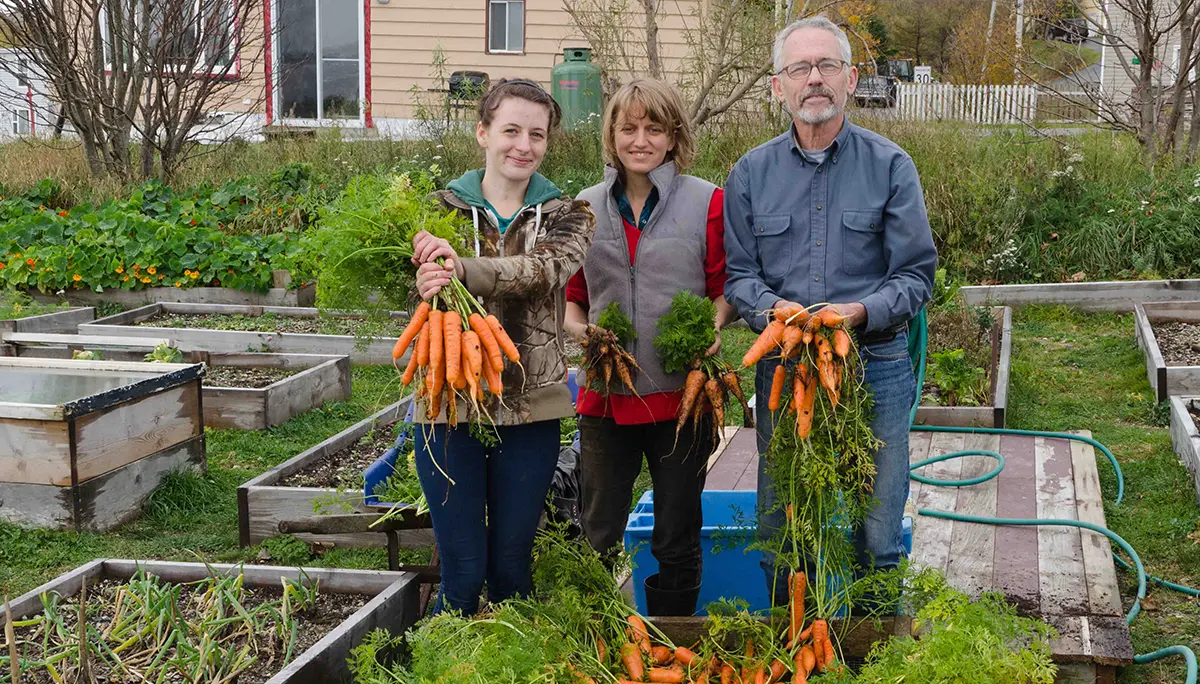Provincial Food Network
Organization: Food Producers Forum
Mission: Food Producers Forum is a five-year old non-profit society, established as an information hub to support and expand food security and community health with projects at the local level in Newfoundland and Labrador.
Location: Newfoundland and Labrador
Communities benefiting directly from the project: We are working with three sites in Labrador, eleven on the island of Newfoundland. The Mercy Centre for Ecology and Justice (St. John's), Avalon Homesteading (Conception Bay South), Burin Community Garden Group (Marystown), Campbellton Berry Farm (Campbellton), Knotty Pine Farms and Apiary (Port Blandford), King's Point Community Garden (King's Point), Upper Humber Settlement (Cormack), Benoit First Nation (Port au Port Peninsula), Western Environment Centre (Corner Brook), Gros Morne Farm & Market/Bonne Bay Cottage Hospital (Norris Point), Smith Family Farm (Raleigh), Mary's Harbour Community Garden (Labrador coast), NunatuKavut Community Council (Southern Labrador) and Labrador West Community Garden (Labrador West).
Country: Canada
Other Organizations Involved: We are supported partially by federal CSRF funding and provincial funding from the Department of Industry, Energy and Technology, plus some support from Memorial University’s Office of Public Engagement. Our project partners include the NunatuKavut Council, Benoit First Nation, Western Environment Centre and the Mercy Centre for Ecology and Justice, as well as community groups and family farms within the Network. This is a well-developed public engagement project with a network that spans the entire province. In addition, we have assembled an advisory panel made up of 32 local experts in farming, food marketing, food safety, food technology, community heath, foraging and hydroponic production, to advise and support our project sites.
 @ Dan Rubin
@ Dan Rubin
Background
Based on five years of intensive research and information gathering, including a three-day online provincial conference in May 2022, and completion of a detailed survey that fall, focused on community food production in our province, we have set out to create a network of food production and education sites to address the deeply linked problems of food insecurity, food inequality and community health. By supporting and promoting community production of health, local food at 14 urban and rural sites, we will be linking communities across our province to build a resilient network for food production and education. Our sites include 3 food education centers, 2 Indigenous community organizations, 4 community gardens and 5 family farms. By linking these sites we will provide exchange of knowledge and local experience, and promote regional educational programs to help rebuild food skills, in farming, gardening, foraging, food processing and food storage.
Goals
Our overall goal is to make a significant dent in food insecurity and also reduce the carbon load of industrial food production and long-range shipping. Our secondary goals are to create a resilient well-connected network of community sites engaged in food production and education, and to demonstrate and promote to the public our capacity to grow and gather local food.
Main activities
In this project we are building a network, while providing expertise to expand food production, helping solve problems and address specific needs at the local level to enhance and support production of food that is local and healthy.
We hold monthly online meetings with our site representatives; we have visited their sites and interviewed them to identify their primary needs; we distribute timely, substantive information and have collected a board of highly trained, knowledgeable advisors to assist them; we are now able to provide up to $197,000 in direct funding to help them build needed structures and acquire equipment to support and expand their food production capacity. This fall, we will convene a founding conference in Cormack, NL to establish a formal cooperative structure for the Provincial Food Network, to develop its capacity to endure and become financially sustainable and then grow into the future.
Expected outcomes
As result of the work we have outlined above, we hope to see a significant expansion in community-level availability of healthy, local food at our project sites. We also want them to become regional hubs, inspiring other communities and local groups to develop this same capacity, while knitting together a resilient network of information and knowledge exchange right across our province. In addition, all our sites are committed to hosting educational workshops, mentorships, and other educational opportunities to broadly expand community food skills. This work is a primary example of working toward reconciliation through the direct partnerships with the Indigenous communities that are part of this project. At the end of the day, the results will be simple: more healthy food moving from farm and garden to local mouths.